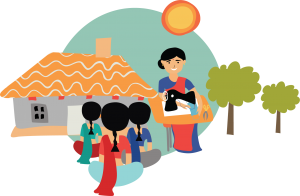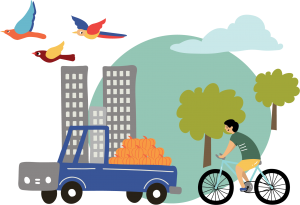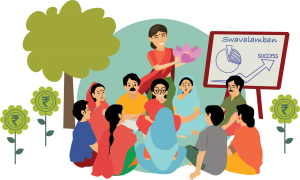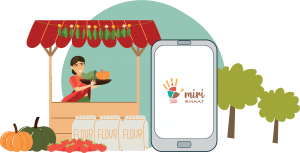Our Work
Enabling Services
- Skill Development
- Supply Chain Services
- Financial Inclusion
- MIRI Market
 Skill Development
Skill Development
As part of our capacity building initiative Drishtee has set up Drishtee Skill Development Centre (DSDC). DSDC seeks to impart employability training to the target youth that equips them with skill- sets to help earn sustainable livelihood, either by acquiring employment in the organized/unorganized sector or by setting up micro enterprises or rural production centers. DSDC customizes the training program to suit the needs of community, to provide the localized inputs for better outcome, and ensure accessibility and adaptability of the program. DSDC works with different sector skill councils to define the programs to be compatible with Standard Curriculum Framework defined under NSDA (National Skill Development Agency, India). DSDC covers training on agriculture and allied services, constructions, apparel and home made-ups, beauty and wellness, IT/ITes, banking and finance, tourism and hospitality, plumbing and handicrafts.
Aim: To build capacity of rural communities on need based skill sets to help them earn sustainable livelihood. To build capacity to enhance their employability to ensure livelihood.
 Supply Chain Services
Supply Chain Services
Drishtee aims to create channel which connect rural and urban community to sustain livelihood and access to services and product to enhance quality of life of people. Keeping this in mind Drishtee create a snowballing effect in the rural market by creating reverse supply chain network, which has the capacity to service many local entrepreneurs as against owning these retail points directly and creating a market for rural products as well. Drishtee unique supply chain network reduces the need for a higher capital investment, and lowers the overall risk by sharing it with a large base of rural entrepreneurs (village based retailers as well as village based micro-enterprises). In addition, Drishtee’s emphasis on establishing a delivery network (not just for urban manufacturers who wish to push into rural areas as well as for village-based micro-enterprises also) strengthens its first mover advantage and creates a significant entry barrier for organized retail. Since, the same network shall procure from village-based micro-enterprises, it shall enhance their sustainability as well as positively impact Drishtee’s net margins as well as bargaining ability with urban manufacturers of similar product categories. Its model of working with local entrepreneurs (both the village-based small retailer as well as village-based micro-enterprise) is socially and politically sensitive of the rural environment as it distributes wealth across the spectrum rather than concentrating it in the hands of a few companies as in the case of organized retail and procurement only from urban producers.
Aim:
- Develop decentralized, low cost channel and distribution network which create links between rural and urban livelihood
- Better access to services and products to improve quality of life.
 Financial Inclusion
Financial Inclusion
Despite the large size and depth of India’s financial system, the majority of the rural poor do not have access to formal financial services. With the reach of its rural network, Drishtee is in a unique position to extend banking services in rural communities. These services offer a unique opportunity to address the needs of the marginalized community and is in sync with Drishtee’s mission of ‘enabling the development of rural economy and society’. The idea is to create viable business opportunities for entrepreneurs in villages who provide financial services (including banking, pension and insurance) and thus help to create an ecosystem with relevant micro-enterprises that can be funded. Drishtee has Implemented kiosk banking system and Micro ATMs/Pin Pads through about 1500 active kiosks from 2006 in various locations of India.
Aim :
- The aim of Financial Inclusion is to provide access to banking and financial services to the rural populace.
- Financial inclusion initiative is responsible for providing access to “Capital” and other financial services . On a broader approach, this includes various financial services like banking, insurance, pensions, payment solutions etc.
 MIRI Market
MIRI Market
Making in rural India (MIRI) is an online and offline platform enabling rural producers to be market ready besides connecting them to rural and urban customers. Thus creating a virtual Prosumer Economy. It technologically enables the supply chain management system to make it more efficient and scalable.
Aim
Ongoing Projects
Brief – Food & Snacks (Agriculture), Clothing – Retail shops, Sewing, Cutting & Stitching, Finishing (Textile) and Home Décor (Dogra Art) based Micro Enterprises; Training and Capacity Building; Market Connect. Creation of livelihoods by engagement in Mushroom production units and development of micro-enterprises & business ecosystems.
Thematic Area- Livelihood & Sustainable development
In Partnership with – Vedanta ESL
Location – District Bokaro in Chandankiyari and Chas Blocks
Udyogi Parivars (Rural producer families) register on the MIRI Market platform where they can connect Vaibhavi groups with local and rural markets and MIRI retail for volume distribution of products covered in Roti, Kapda & Makaan.
Thematic Area – Livelihood & Sustainable development
In Partnership with – PNB Bank
Location & Duration – District Shivsagar at Bordewdhai, Japikhujia and Salaguri Gaon
Direct Beneficiaries – To develop 300 Marginalized women producers, 100 customers in 1 Vatika, 3 Vaibhavi groups & 1 Vaani Training Centre
Community mobilization and outreach programme includes intensive use of Technology as enabler of connect with local entrepreneurs, women and other community members. This helps in strengthening the Product line of Micro-enterprise Groups (Vaibhavis). Strengthening the Product line of Micro-Enterprise Groups (Vaibhavis), Training & Capacity building of Women Producers (Sakhi – Udyogis) & MEGs (Vaibhavis) for new products and value addition, Launching new MIRI Circle App for more efficient Producer-Customer connect, Launch of Online Learning Management System (LMS) for Producers (Sakhi-Udyogis), Launch of Integrated MIRI App, Expanding the distribution network to places outside Varanasi, Launch of Damini Training Centers of Excellence in Urban and rural Varanasi, Addition of 1 New Value Chain- Waste & Waste management. We are also conducting “Financial Literacy Camps” across villages for the beneficiaries covered under this project.
Thematic Area – Livelihood, Capacity & Sustainable development
Location & Duration- District Shivsagar – Bordewdhai, Japikhujia & Salaguri Gaon In Partnership with Pnb Metlife
Direct Beneficiaries & Impact To develop 300 marginalized women producers, 100 customers in 1 Vatika, 3 Vaibhavi groups & 1 Vaani Training Centre
Community-led 360-degree business ecosystems enabled for marginalised rural women. Development of Seven Vatikas- Rahil, Mangarauni, Ranti, Saurath, Mureth, Kapsia, Basauli across 1,2 or 3 villages within a panchayat have been initiated. These are at different stages of their progress with respect to CAP (Common Action Plan) designed for Vidushi members who are actually driving the formation of all Vatikas taking full ownership under the capable guidance and mentorship of seniors. The well prepared Plan for each Vatika begins with the formation of Swavalamban Samiti (SWSM) that constitutes the selection of key members from the respective society / village, selection of Saarthi & Saarthi members from local area, holding Grand village meetings and development of 6 petal members including Vaani learning Centre (known as Hunar – Ek Pehchaan). All ongoing initiatives on this project are aimed at creation of livelihood and self-sustainable income for the targeted rural women as per the vision & mission set by the Drishtee founders, keeping in view the satisfaction of all the stakeholders including our valued partner.
Thematic Area – Livelihood & Sustainable development
In Partnership with MetLife Foundation
Location & Duration – District Madhubani Rahil, Mangarauni, Ranti, Saurath, Mureth, Kapsia, Basauli – Vatikas
Direct Beneficiaries – 21 Vatikas planned in one district over 3 years (7 per year) – FY 2021 to 2023. Development of each Vatika planned in 16 weeks with 300 producers, 100 Urban consumers, 1 Vaani Centre & 3 Vaibhavi groups.
The project has been implemented consistently in various locations across India. Activities under this project include planning and Designing the Integrated Approach, local Stakeholder Identification and Activation, financial Inclusion and Skill Development Centre Initiation, supply Chain and Retail Activation skills Development, Literacy and Micro-Enterprise (ME) Development, market Connect and Handholding of Target Beneficiaries. To initiate community-driven local livelihoods in villages. Family mapping and resource mapping to identify community members who can become agents of change and take ownership. Train lower skilled individuals in existing trades and introduce new ones to compliment the local ecosystem and market. Provide capital support and handholding Micro Enterprise Group (MEG) Vaibhavi set ups. Currently, development of several Vatikas are at various stages of progress under the Swavalamban model approach.
Thematic Area – Livelihood & Sustainable development
Location & Duration- Districts – Varanasi (Uttar Pradesh), Bhagalpur and Madhubani (Bihar), Korba (Chattisgarh) and Kamrup (Assam) In Partnership with Greater Impact Foundation (GIF)
Direct Beneficiaries- Form 7 Vatikas in 2021-22 in one district. Development of each Vatika planned in 16 weeks with 300 producers, 100 Urban consumers, 1 Vaani Centre & 3 Vaibhavi groups
Skill Training in Art and Product – Based Designing for Rural Artists focusing on women & local traditional arts, especially Painting. This was initiated in Nov’ 20 in Madhubani & Bhagalpur – Bihar, in partnership with Ricoh, Japan. Enabling rural women with art and design-based skills for livelihood generation, this project has been initiated with dual purposes – “Harnessing Talent” and “Enabling Livelihoods”, while nurturing the local artists and skills.
Thematic area Skill Training & Rural Livelihood
Location Districts of Madhubni & Bhagalpur in Bihar
In partnership with Ricoh Direct Beneficiaries 40 rural women to be trained in art based and textile based design
Project for overall mapping of Financial Service availability and connecting rural communities with financial services; Organising financial literacy camps for different types of service users, sharing information on social security schemes, etc.
Thematic area– Rural Financial Inclusion
Location Kashi Vidyapeeth Block in District Varanasi
In partnership with PnbMetlife
Direct Beneficiaries Financial literacy programme for 1000 Women to be conducted through 38 Camps
To identify a dynamic lady Rural Woman Entrepreneur (RWE) in each of the catchment Panchayat (hub village) based on qualification such as income, education etc. for the role of ‘RWE’ and introduce her to the community in each Panchayat. Train the RWE on each Nestle FMCG product and its USP Connect the RWE with the local distributor and sales officers for supply of reordered quantities in her assigned village.
Thematic area – Rural livelihood creation & sustainable development
Location District Varanasi – 100 Villages across district.
In partnership with Nestle
Direct Beneficiaries– 100 RWEs (one in each district) to be identified & trained to market Nestle products
We have stepped forward to help village communities especially women and senior citizens who have no access to smartphones and internet or are not Tech-savvy, don’t know how to use the booking apps (Aarogya Setu or CoWIn) or portal to register themselves for COVID vaccination and take appointment. We also avail services of our CSPs (Customer Service Points) on this programme. Our initiative is focussed mainly around following 3 agendas:
- Awareness Creation
- Registration and Appointment
- Organise Vaccination Camps
- Free Mask Distribution
- We operate door-to-door campaigns and cover a sizable population amongst the targeted group, organise transports & buses for citizens to travel till the vaccination centres. We take village authorities and influential people into confidence and their support is sought in the drive by circulating the right information and encouraging the residents to learn about the vaccination process and its benefits.
Thematic area To strengthen immunization service delivery for rural marginalised women
Location Across Gram Panchayats & villages located in North East (NE) State of India
In partnership with Greater Impact Foundation (GIF)
Direct Beneficiaries To organise 350 to 400 Camps Supporting 1 million beneficiaries get Vaccinated in one year.
The launch of a two-tiered competition with loan support for viable models for people to submit their business plans for a micro rural enterprise. The first round of competition will be at the division level (There are four divisions in Karnataka). Selected viable ideas of the division level will be provided to receive loan and handholding to roll out their idea in the district. Successful ideas/plans after six months will then qualify for overall competition. The selected candidates of the overall competition will receive funds to replicate their proposal across the state. The ideas invited should be such that:
- An idea which has been tested and requires funds to grow.
- It can create rural livelihood,
- Financially and environmentally sustainable,
- Require small investment (Rs.100,000 or more depending on business model),
- Can be scaled in different parts of Karnataka.
Thematic area To support innovative ideas to help create Micro Rural Entrepreneurs
Location Karnataka -all districts across Belgaum and Kalburgi Divisions
In partnership with Ashoka
Direct Beneficiaries To select 500 ideas/plans with 50% women which can create 2000 jobs in next 24 months
Past projects and Initiatives
Women Entrepreneur
A social enterprise promoted by Drishtee and is owned by rural women producers and supervised by textile professionals.The organization envisions enabling underprivileged women community and crafts clusters by providing sustainable employment opportunities in traditional textiles. DRAP mission is to impact the livelihood of 5000 marginalized women by 2020.In coming years, DRAP will become fabrics apparels and handicrafts catering to the mass market. With the team of experts and professionals from the field of Design and Handicraft, we are nominating the 3 clusters for the Design and technology Up-gradation.
Impact
500+ women in the cluster of Bhagalpur, Bihar were connected with DRAP for their livelihood. DRAP promotes the sales of produce goods through e-commerce channels like Jabong, Amazon etc to name a few. Ethnic khadi Fabrics are also produced by spinning and weaving handloom techniques
Tagline– connecting marginal women farmers to urban female consumers.
Brief– It is a social venture of Drishtee that provides a unique platform for marginal women farmers and urban women consumers to connect through the means of vegetables.
Problem/Challenge
To provide a marketplace and competitive prices for the vegetable produce.
Vision
Drishtee envisages that the benefits of the connection experienced between farmer and consumer will lead to shared prosperity for both.
Approach/Solution
The MadhuKrishi platform encourages the farmer and consumer to feel more
responsible towards each other, transforming the current opaque and transactional arrangements into transparent and vibrant relationships.
Impact – Naujheel Block, Mathura District is situated around 120kms away fromMadhuKrishi’s urban warehouse. MadhuKrishi currently is connected to 25 veggie producers from whom we buy vegetables at a price that is higher than what the farmers get from the Mandi. These veggies are supplied to 200 households in MNC and local apartments of the NCR region.
Way Forward/Learning
This platform will encourage farmers and consumers to interact, appreciate and help each other as one big family. Further prospect is to engage the Farmer producers in formal FPOs and develop the capacity for quality and ethical production. Madhukrishi intends to be source of organic and healthy food basket of urban household and give maximum profitable return to producer farmers.
MOMO project is in partnership with RICHO, Japan to empower the women of the rural communities, by providing access to a variety of women’s products and by creating livelihood opportunities to improve the quality of their lives. Rangoli shops are one which are operated by Women and exclusively for women. The Concept was initiated to understand the challenges of the female population in rural parts who have limited access to critical women products that can significantly improve their health and wellbeing, and ultimately, their quality of life. Additionally to this Rangoli is a platform for creating and empowering women entrepreneurs who can comfortably manage the shop without social barriers.
Impact
42 shops were operated by women in villages of Bihar and Uttar Pradesh. The plan was to expand 300 shops.
Housing
The Gharaunda project aims for an easy scalable model by being attractive for the rural villagers (for its very low cost,fast/methodic construction process, suitability and the broader standard of the “minimum living requirements”) and for the financing entities (low & controlled budgets, tested housing model). This project was launched in Bihar, 2015 as part of community development.
Education & Skilling
It is an innovative learning program to transform education by imparting indigenous knowledge and helping children become independent learners with appreciation and incorporation of the local knowledge system. This is to enable the young students with a deep connection to local trades and entrepreneurship and empower them for being self-reliant with respect as well as hands-on knowledge of local skills, trades and resources. There are many local opportunities and new innovation ideas that are possible if the new generation is well educated with a good capacity of language proficiency, mathematical skills, as well as hand-skills.
Impact
The program was implemented for 650 students of Naujheel block in 2 private schools.
Tagline– providing livelihood training
Brief– Drishtee has partnered with Godrej Agrovet to provide skill based livelihood training to farmers and youth under its flagship program “Samarth”. It provides skill based livelihood training to farmers and youth. The project operated for 3 years from 2013 to 2016 at three different locations- Uttar Pradesh, Bihar and Madhya Pradesh.
Problem/Challenge
Vision
At Godrej the sustainability strategy, Good & Green, is driven by the desire to help create a more inclusive and greener India. Launched in 2011 as one of the four key imperatives for 2020,Godrej Good & Green is based on shared value, a principle that aligns business competitiveness and growth with social and environmental impact.
Approach/Solutions
In the Samarth program, both Drishtee and Godrej Agro vet conduct training to increase farmer productivity. Samarth provides training to small and marginal farmers in Animal Husbandry and agriculture.
Impact
As for impact within training phase – 25% of total trained farmers saw yield increment directly contributing to their 20% milk yield increment and income enhancement by 600-1000 rs per month. Farmers covered 12500 with social and environmental impact.
Community Building
Drishtee – Samaahit is a platform for the aspirants from Corporates, Social Sectors, Governmental /Non Governmental organizations to get back to roots of rural India for unique experience of learning, co-creation and support with ideas, innovative approach for overcoming the local challenges with sustainable solutions. Drishtee facilitate partnership between stakeholders and remote communities for co-creating sustainable solutions through Immersion approach.
Impact
Teams from National/International level Corporates,Technical Institutions has being participating in Immersion events in Saurath Village in Madhubani,Bihar and Nauhjheel Block in Mathura, Uttar Pradesh – Participating organization -RICHO, JRI, Sumito Chemicals for Japan, Australia
University, FinPro – Finland. MOMO Rangoli stores is one of the successful outcomes of Social Immersion Activity.
Health
Shruti Shakti Hearing aids research project is a pilot project with our partner “RION” to test the viability of the Hub and spoke model for “Audiometric clinic and Hearing aid centre” at the Block (Hub) and mobilizers at the village(Spoke). Our mission is to empower the community to hear through sensitizing the public about hearing loss and promoting the importance of prevention as well as provide the platform for treatment.
Impact
756 community members benefited from the project.
Colgate Bright Smiles Bright Futures (BSBF) program is an oral health awareness generation program which was conducted in schools of rural areas for the primary class students. Target group for the program were the government/private schools which can be either primary,
primary with secondary or primary with higher secondary category for grades 1 – 5 exclusively. In partnership with Palmolive the project was implemented in Assam, Uttar Pradesh and Bihar.
Impact
42,03,151 students from Primary (government/private) schools went through the training.
